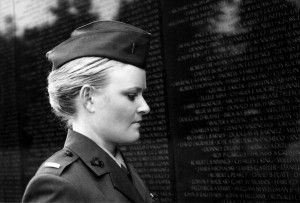
Transcript Correspondent
American culture holds soldiers in high esteem—we honor them with medals, parades, holidays and discounts. But the award winning documentary “The Invisible War” shows that not all soldiers are treated equally.
On April 3, “The Invisible War,” which depicts the increase in sexual assaults in the military and efforts by the government to ignore the problem, will be shown at OWU.
“Where I come from, and pretty much everywhere else in the world women are not treated very respectfully” said senior Iftekhar Showpnil, organizer of the event. “It really bothers me because I really love my mom and my sister. So I always think about what would happen if something like this happened to them.”
Senior Glenn Skiles said she thinks the film’s message is important because “it’s reflective of a greater societal problem.
“Charges of rape are often times portrayed as being an inconvenience to the perpetrator and not as a violation of a woman’s right to consent,” she said.
Since 2006, close to 95,000 service members have been sexually assaulted. Of those incidents, approximately 86 percent go unreported. Of those that are reported, less than five percent go to trial and only a third of those result in imprisonment.
“I feel like everyone knows someone in the military,” said junior Oore Ladipo. “The knowledge that this could affect people you know makes it personal, and the frequency of cases makes it a serious problem.”
When considering what can be done about the situation, Showpnil referenced steps his fraternity, Alpha Sigma Phi, took to educate its members.
“We organized an event for men of our fraternity on how to deal with sexual assault and what can we do as men to prevent it,” he said.
According to its website, Invisible No More, the film’s companion organization, aims “to raise awareness,” “effect cultural change” and “serve as a means of healing for survivors of military sexual assault” through the film.
Ladipo said he thinks the problem of military rape and sexual assault requires both legal and social justice.
“This situation can only be solved by legislation leading to the punishment of sex offenders within the army and a proper education,” he said. “…Part of that education lies in society’s attitude toward rape culture. This is something that I feel needs to be discussed.”
Members of Congress feel similarly and have begun to act on the problem.
In 2012 Rep. Mike Turner (R-OH) and Rep. Niki Tsongas (D-MA), formed the Military Sexual Assault Caucus to combat sexual misconduct in the armed forces.
Turner and Tsongas authored the Defense STRONG Act, which expands the legal rights of those who claim to have been assaulted to include base transfer and confidentiality when seeking assistance.